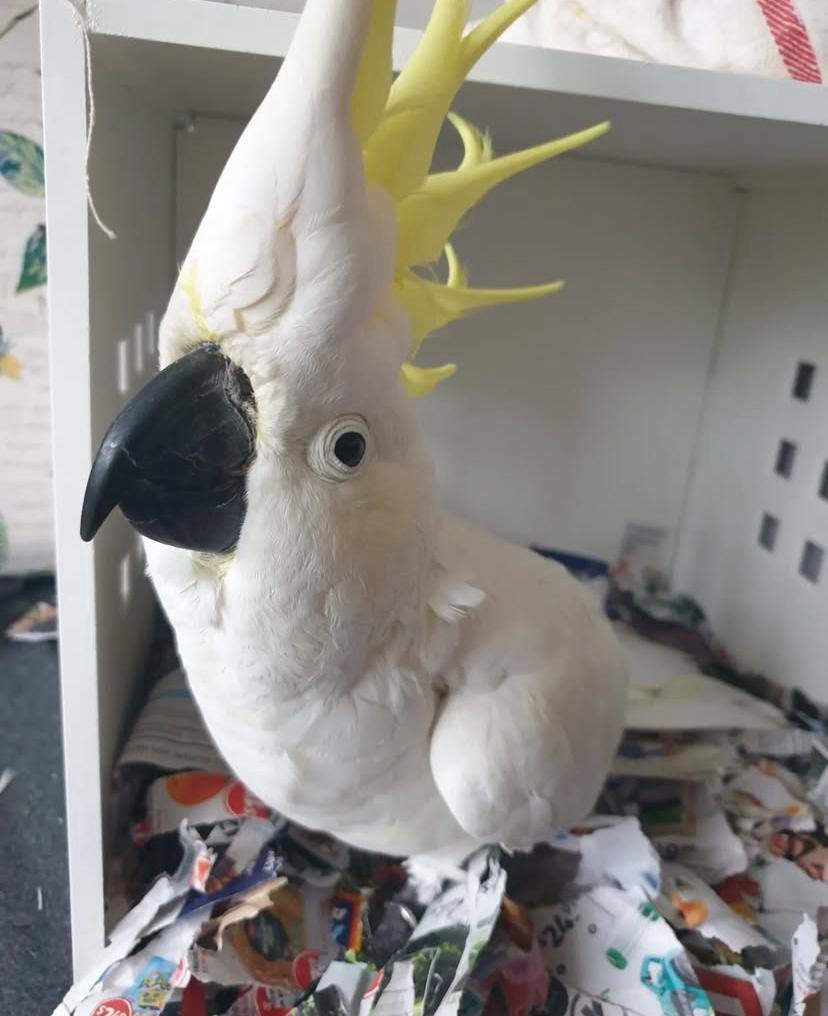
Can cockatoos eat fruits and vegetables?
As a breeder and owner of these incredible birds for over two decades, I, Michael Anderson, can tell you that the question “Can cockatoos eat fruits and vegetables?” is one of the most important you can ask. The answer is a resounding “yes,” and incorporating a wide variety of fresh fruits and vegetables into your cockatoo’s diet is absolutely essential for their health, happiness, and longevity. While commercial pellets should form the foundation of their diet, these fresh foods are the key to providing the vitamins, minerals, and mental stimulation they need to thrive.
Key Takeaways
- Fruits and Vegetables are Essential: Fresh produce should be a significant part of a cockatoo’s diet, supplementing a high-quality pellet base. This varied diet mimics their natural foraging behavior and prevents nutritional deficiencies.
- Variety is Vital: Don’t stick to just one or two types of produce. A diverse range of colors and textures ensures your cockatoo gets a broad spectrum of nutrients.
- Know the Safe and Unsafe Foods: While many fruits and vegetables are safe, some are toxic. You must know what to avoid to protect your bird.
- Moderation is Key: Fruits are higher in natural sugars, so they should be offered in smaller quantities compared to vegetables to prevent weight gain and other health issues.
- Freshness and Preparation: Always wash produce thoroughly and cut it into manageable pieces to prevent choking and ensure cleanliness.
- Transactional Intent: This guide is designed to empower you with the knowledge to provide the best possible care for your cockatoo, and by doing so, to encourage you to consider us at THE COCKATOO HOME as your trusted source for a healthy, well-cared-for parrot.
The Foundation of a Healthy Cockatoo Diet: Pellets, Fruits, and Vegetables
When you welcome a cockatoo into your family from THE COCKATOO HOME, you are getting a bird that has been raised on a diet that is as close to perfect as we can make it. This is why the question, “Can cockatoos eat fruits and vegetables?” is at the core of our care philosophy. It’s not just about what they can eat, but how that food contributes to their overall well-being.
A seed-only diet, which many people mistakenly believe is sufficient, is a recipe for disaster. It leads to obesity, liver disease, and a host of other health problems due to a lack of essential vitamins and minerals. Think of it like a human eating only junk food it might be tasty, but it’s not sustainable for long-term health.
The diet for a healthy cockatoo should be primarily a high-quality, formulated pellet. This provides the baseline nutrition the vitamins, minerals, and protein they need every day. But a diet consisting solely of pellets, no matter how good they are, is boring for a bird. In the wild, cockatoos spend a huge portion of their day foraging for food, and this activity is both a physical and mental workout.
Offering a variety of fruits and vegetables mimics this natural behavior, enriching their lives and preventing boredom-related issues like feather plucking. So, to truly answer “Can cockatoos eat fruits and vegetables?“, you have to understand that it’s not just a dietary question, but a behavioral one. A bird that is engaged with its food is a happier, healthier bird.
I’ve seen so many birds come from other sources with a poor diet, and the transformation that happens when they are introduced to fresh produce is incredible. Their feathers become brighter, their energy levels increase, and their personalities truly shine. It’s a testament to how crucial a balanced diet is. At THE COCKATOO HOME, we don’t just sell you a parrot; we provide you with a comprehensive care guide and ongoing support because we are invested in the lifelong health of our birds.
A Detailed Look at Safe Fruits and Vegetables for Your Cockatoo
When we talk about whether a cockatoo can eat fruits and vegetables, we need to get specific. Not all produce is created equal, and some common human foods are toxic to birds. Our expertise at THE COCKATOO HOME means we’ve put together a comprehensive list of safe foods that will keep your parrot healthy and happy. This is a crucial part of our transactional intent—we want you to have all the information you need to make the right choices for your new feathered family member, and this detailed guide is a demonstration of our commitment.

Safe Fruits for Cockatoos:
- Apples: A great source of Vitamin C and fiber. (Crucial Note: Always remove the seeds and core, as they contain trace amounts of cyanide.)
- Bananas: High in potassium and magnesium. A soft treat that’s easy for them to eat.
- Berries: Blueberries, raspberries, and strawberries are packed with antioxidants and are lower in sugar than many other fruits.
- Melons: Watermelon, cantaloupe, and honeydew are hydrating and full of Vitamin A and C.
- Mango and Papaya: Tropical fruits that are rich in Vitamin A. Be sure to remove the skin and pit.
- Pears: A good source of fiber and Vitamin C. (Again, remove all seeds.)
- Kiwi: High in Vitamin C and antioxidants.
- Grapes: A sweet treat that should be given in moderation due to high sugar content.
Safe Vegetables for Cockatoos:
- Leafy Greens: Kale, spinach, Swiss chard, and dandelion greens are nutritional powerhouses.
- Carrots and Sweet Potatoes: Excellent sources of Vitamin A. Cooked sweet potato is a favorite.
- Broccoli and Cauliflower: Rich in vitamins and minerals. The florets and leaves are both safe.
- Bell Peppers: A fantastic source of Vitamin C. All colors are safe and a fun, crunchy treat.
- Peas and Green Beans: A good source of protein and fiber. Can be served raw or lightly steamed.
- Zucchini and Pumpkin: Can be served raw or cooked and are great for variety.
- Corn on the Cob: A fun and engaging food that provides both nutrition and entertainment.
This list isn’t exhaustive, but it provides a great starting point for anyone asking, “Can cockatoos eat fruits and vegetables?” By varying the types of produce you offer, you ensure your cockatoo gets a balanced diet and never gets bored.
The Dangers of Unsafe Foods: A Critical Can Cockatoos Eat Fruits and Vegetables? Guide
Just as important as knowing what to feed your cockatoo is knowing what to avoid. This information is vital for the safety of your bird and is a cornerstone of our expertise at THE COCKATOO HOME. We want to be a source of trustworthy information, which is why we’re direct about the dangers.
Toxic Foods to Avoid at All Costs:
- Avocado: All parts of the avocado—the fruit, skin, and pit—contain a substance called persin that is highly toxic to birds. It can cause heart failure and even death.
- Chocolate: Contains theobromine and caffeine, which are toxic to birds and can cause a host of problems from vomiting to seizures.
- Onions and Garlic: These contain sulfur compounds that can cause anemia in birds.
- Fruit Pits and Seeds: While the fruit is safe, the seeds and pits of apples, cherries, apricots, and peaches contain cyanide and should always be removed.
- Rhubarb: The leaves are toxic to birds due to high levels of oxalic acid.
- Salty and Fatty Foods: Foods high in salt, sugar, and fat, like chips, candy, and fried foods, can lead to serious health issues like kidney disease and obesity.
- Alcohol and Caffeine: These substances can be fatal to birds, even in small amounts.
By understanding what a cockatoo can eat, you are demonstrating your commitment to their health. This knowledge is not just about feeding them, but about forming a bond of trust and care.
A Guide to Top Cockatoo Breeders and Ethical Care Practices
While we at THE COCKATOO HOME are dedicated to providing the healthiest, happiest cockatoos, it’s important for prospective owners to be aware of the hallmarks of a reputable breeder. This knowledge empowers you to make an informed decision and is a key part of our transactional intent—we want you to choose us because you see our commitment to ethical, expert care. This isn’t just about selling a parrot; it’s about finding the right home for our birds, and that starts with an educated owner.
A reputable breeder will always prioritize the health and well-being of their birds above all else. They will have a clean, spacious aviary, not a cramped cage. They will be transparent about their birds’ health records and will conduct DNA testing and health screenings to prevent the spread of diseases. They will hand-raise their chicks from a young age, ensuring they are well-socialized and comfortable with human interaction. They will also be a valuable resource for you after you take your parrot home, providing ongoing advice and support.
This is a transactional intent because when you are looking for a cockatoo, you are not just looking for a pet. You are looking for a companion, a new family member. We at THE COCKATOO HOME understand this deeply. Our reputation is built on the trust we’ve established with countless families. We provide a full health guarantee, a detailed care guide, and we are always just a phone call away.
Our goal is to ensure that your experience with a cockatoo is as joyful and rewarding as possible, and that begins with providing you with a bird that has been raised with the utmost care and expertise. Our entire process is a part of this user-friendly guide, and we believe that by sharing our knowledge, we show you why THE COCKATOO HOME is the right choice.
Conclusion
So, to circle back to our original question, Can cockatoos eat fruits and vegetables? The answer is a definitive yes, and they should be a cornerstone of your cockatoo’s diet. As a breeder with years of experience, I can’t stress enough how vital a varied and balanced diet is for these incredible creatures. A high-quality pellet diet, supplemented daily with a wide array of safe, fresh fruits and vegetables, is the key to ensuring your cockatoo lives a long, healthy, and vibrant life.
At THE COCKATOO HOME, we’ve seen the incredible difference that proper nutrition and care can make. It’s not just about what you feed them; it’s about the love, attention, and knowledge you put into their care. We are here to provide not just a parrot, but a partner in your journey.
Frequently Asked Questions
Q: Can cockatoos eat fruits and vegetables every day, and how much should I give them?

A: Yes, you should absolutely offer fresh fruits and vegetables to your cockatoo every single day. A good general rule is to offer a daily portion of fresh food that is roughly equivalent to 20-25% of their total diet. The majority of this should be vegetables, with fruits being a smaller, more moderate portion due to their higher sugar content. Think of it as a small salad bar for your bird, with a wide variety of items. Providing this fresh food daily not only ensures they get a full spectrum of nutrients but also provides mental stimulation and a fun foraging activity. Remove any uneaten fresh food after a few hours to prevent spoilage and bacterial growth. This is a crucial part of our care guide at THE COCKATOO HOME, because it’s a detail that truly makes a difference in your bird’s health.



